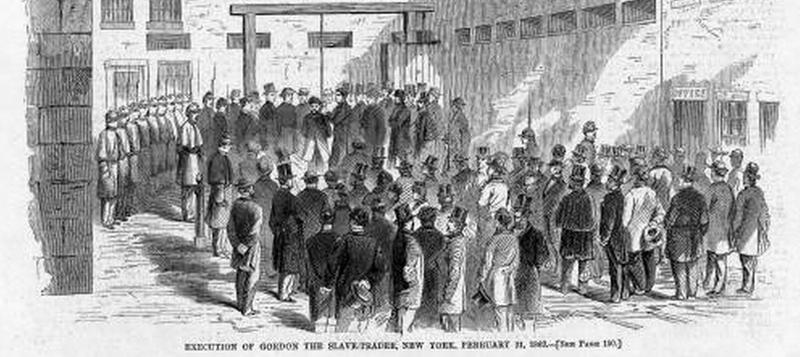 On February 21, 1862, Nathaniel Gordon, captain of the slave ship, Erie, was executed by hanging in New York City. Under the Piracy Law of 1820, slave trading was considered to be an act of piracy punishable by death. He was the only slave-trader ever to be tried, convicted, and executed in American history. Captain Gordon, originally from Portland, Maine was 36. In a detestable trade, Captain Gordan was among the worst. When he was apprehended by the USS Mohican 50 miles off the Congo in 1860, the Erie, a ship of 500 tons, had 897 Africans crammed aboard. Of these, 563 were children. Captain Gordan preferred children because they were smaller and were less able to attempt to take over the ship.
On February 21, 1862, Nathaniel Gordon, captain of the slave ship, Erie, was executed by hanging in New York City. Under the Piracy Law of 1820, slave trading was considered to be an act of piracy punishable by death. He was the only slave-trader ever to be tried, convicted, and executed in American history. Captain Gordon, originally from Portland, Maine was 36. In a detestable trade, Captain Gordan was among the worst. When he was apprehended by the USS Mohican 50 miles off the Congo in 1860, the Erie, a ship of 500 tons, had 897 Africans crammed aboard. Of these, 563 were children. Captain Gordan preferred children because they were smaller and were less able to attempt to take over the ship.
When President Abraham Lincoln refused to pardon Captain Gordon, he wrote: “I believe I am kindly enough in nature, and can be moved to pity and to pardon the perpetrator of almost the worst crime that the mind of man can conceive or the arm of man can execute; but any man, who, for paltry gain and stimulated only by avarice, can rob Africa of her children to sell into interminable bondage, I never will pardon.”
It is unclear whether Lincoln’s reference to Africa’s children was metaphorical, but in the case of Captain Nathaniel Gordon, it could be applied literally.
Harper’s Weekly of March 8, 1862, published “Execution of Gordon The Slave-Trader.” It begins:
Not the least important among the changes which are taking place in the current of national policy and public opinion is evidenced by the fact that on Friday, 21st February, in this city, Nathaniel Gordon was hung for being engaged in the slave-trade. For forty years the slave-trade has been pronounced piracy by law, and to engage in it has been a capital offense. But the sympathy of the Government and its officials has been so often on the side of the criminal, and it seemed so absurd to hang a man for doing at sea that which, in half the Union, is done daily without censure on land, that no one has ever been punished under the Act. The Administration of Mr. Lincoln has turned over a new leaf in this respect. Henceforth the slave-trade will be abandoned to the British and their friends. The hanging of Gordon is an event in the history of our country.
Note: Readers have pointed out that the quote from Harpers contains an apparent error in claiming that “Henceforth the slave-trade will be abandoned to the British and their friends.” Great Britain did indeed abolish slavery in its colonies, excluding India and territories held by the East India Company, in 1833. Slavery in India was not abolished in India until 1861 and in practice continued until the 1890s. It is possible that the writer in Harpers was referring to slavery in British India. Or it may have been simply an error.

Harpers saying , in 1862, that ‘the slave trade will be abandoned to the British’ is not quite accurate.
Parliament passed the Emancipation Act in 1833 and the British Navy had a squadron on the Africa station to enforce this law shortly afterwards.
Just a bit of propaganda, maybe.
The abolition of the slave trade in 1808 and slavery itself officially ended throughout the British Empire in 1834, including in the Caribbean.
Even if we put Harper’s misinformation down to propaganda, there’s no reason to continue to reprint it, Old Salt Blog.
Mike and Sarah,
Thanks for the catch. The Harpers’ writer was either in error or may have been referring to slavery in India, which was ruled by Great Britain. I have added a note to the bottom of the post.